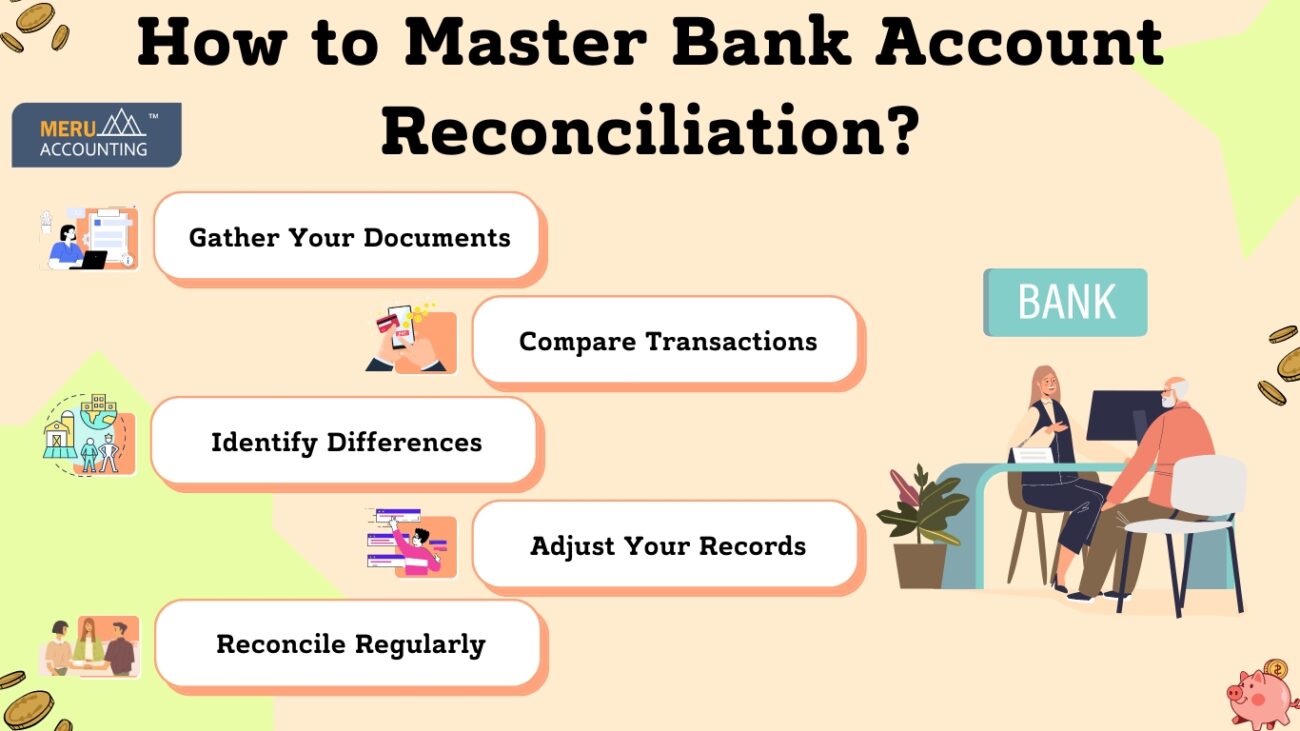
Bank account reconciliation safeguards against errors, fraud, and financial mismanagement. Discrepancies can be promptly identified and rectified by comparing transactions recorded in the accounting system with those listed in the bank statement. Moreover, reconciliation provides invaluable insights into cash flow, allowing individuals and businesses to maintain accurate financial records and make informed decisions. Bank Account Reconciliation ensures that the balance in your records matches the balance shown on your bank statement.
Why Mastering Bank Account Reconciliation is Crucial for Financial Health?
- Accuracy and Transparency: Reconciliation is essential for accurate financial reporting, providing transparency that instills confidence in stakeholders like investors, lenders, and regulators.
- Fraud Detection and Prevention: Reconciliation serves as a primary defense against fraud by identifying discrepancies in transactions and bank statements, allowing for prompt action to prevent potential losses.
- Cash Flow Management: Regular reconciliation offers valuable insights into cash flow, helping individuals and businesses effectively monitor income and expenses for informed budgeting, forecasting, and prompt management of financial obligations.
- Financial Decision-Making: Reliable financial data from reconciliation is essential for informed decision-making, whether for evaluating investments, cost-saving strategies, or negotiating supplier terms.
- Compliance and Audit Preparedness: Regulatory compliance and audit readiness are non-negotiable aspects of financial management. Proper reconciliation practices ensure that financial records meet statutory requirements and facilitate smoother audits, reducing the risk of penalties, fines, or reputational damage.
Tips for Spotting Errors and Irregularities
To effectively identify errors and irregularities during bank reconciliation, consider the following tips:
- Double-check transactions: Review each transaction carefully, ensuring accuracy in amounts, dates, and descriptions.
- Verify Bank Balances: Cross-reference your bank statement balance with your records regularly to catch any inconsistencies early on.
- Investigate Unusual Transactions: Respond to unfamiliar or unexpected transactions and investigate them promptly.
- Utilize Technology: Take advantage of accounting software or tools that offer reconciliation features to streamline the process and minimize human error.
- Implement Internal Controls: Establish robust internal controls, such as segregation of duties and regular audits, to mitigate the risk of errors and fraud.
How to Master Bank Account Reconciliation?
Resolving discrepancies promptly is essential to maintain accurate financial records and ensure the integrity of your accounts.
- Gather Your Documents: Collect your bank statements, checkbook registers, and any other records of transactions.
- Compare Transactions: Go through each transaction on your bank statement and compare it to your records. Make sure every deposit, withdrawal, and transfer matches up.
- Identify Differences: If you find any discrepancies between your records and the bank statement, investigate them. It could be a simple error or a sign of something more serious.
- Adjust Your Records: Make any necessary adjustments to your records to reflect the correct balance. This could involve adding missing transactions or correcting errors.
- Reconcile Regularly: Make bank reconciliation a regular part of your financial routine. Whether it’s monthly, bi-weekly, or even weekly, reconciliation helps prevent issues from building up.
Conclusion
Mastering bank account reconciliation is essential for ensuring the financial health and integrity of businesses, demonstrated through its role in enhancing accuracy, transparency, and fraud detection. At Meru Accounting, we emphasize the significance of timely reconciliation in safeguarding against errors, fraud, and financial mismanagement. With a commitment to excellence in financial management, Meru Accounting provides reconciliation services for sustainable business growth.

